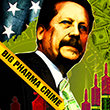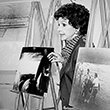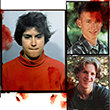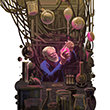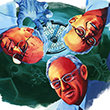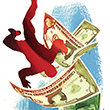
This is a hymn about liberty, an optimistic paean to the advance of humanity …
… but first we must recall some setbacks in building a sane society.
During morning rush hour on March 22, 2016, deranged cowards bombed the Brussels airport and a subway station, killing at least 31 innocents. On November 13, 2015, terrorists in Paris murdered 130 people. The killers proclaimed their religion gave them an absolute duty to massacre non-believers. This group was an outgrowth of a tiny, very diseased strain of Islam whose earlier iterations included the September 11, 2001, obliteration of almost 3,000 lives.
On April 19, 1995, a terrorist blasted apart a government office building in Oklahoma City, slaughtering 168 people, including 19 children. An Islamophobic media “expert” pointed a finger at Muslims, proclaiming the blast showed a “Middle Eastern trait.” As it turned out, the bomber had been heavily influenced by “Christian Identity,” a repugnant and racist theology that has metastasized among far-right wingnuts.
In 2005, the Ku Klux Klan “mastermind” of the 1964 “Mississippi Burning” murders of three civil rights activists was finally brought to justice. The Klan organizer, dubbed “Preacher,” was an ordained Baptist minister. The Klan—responsible for thousands of lynchings—claims to be a Christian organization.
Yes, lethal hatred often has a religious veneer. Some religions are despised; others feel they are superior. Christians kill Muslims, and vice versa. Type A Christians murder Type B Christians, ditto with rival Islamic sects. Christians and Muslims periodically savage Jews. Israelis and Palestinians have been at each others’ throats for seven decades. The eradication of pagan faiths in the Dark Ages, the Inquisition, the Salem witch trials, the suppression of Native American religions—all are among thousands of stains on human history that have one element in common: religious bigotry.
Too often those clamoring for blood wield government as their deadliest weapon. Burning “heretics” often had more to do with controlling wealth and power than purifying theology. English Protestants and Catholics, each coveting the throne, piously massacred each other. The 1990s Balkan slaughterhouse was a three-way rampage involving two variants of Christianity and Islam. The almighty state became most depraved during the Nazi’s attempted erasure of Judaism. American slavery was often defended—and still is by some—as “good” because victims were stripped of their own religions and forced to embrace Christianity, or else face death.
“Religion is the first sense of community,” Mr. Hubbard wrote in 1976. “Where one can destroy or undermine religious institutions then the entire fabric of the society can be quickly subverted or brought to ruin.”
The cynics’ response to the carnage? “The last king should be strangled with the entrails of the last priest” is an aphorism attributed to several wags, including Enlightenment writer Voltaire, philosopher Denis Diderot and French priest (and closet atheist) Jean Meslier.
Other Enlightenment figures brushed aside such glib denunciations of religion and government. These forward-thinking leaders contemplated a society where peace could flourish by disengaging religion from the state, by replacing bloodshed and animosity with tolerance and dialogue. Competition for spiritual beliefs could then move to the arena of minds and hearts, not guns and swords.
That incredibly radical idea was encoded in the First Amendment to the U.S. Constitution. The Founding Fathers’ most potent thinkers were “deists,” not Christians. They believed a Supreme Being existed but that humanity was responsible for its own salvation—or destruction. That thinking is close to the basic tenets of Scientology.
The antithesis of the First Amendment occurs when a U.S. official or politician proclaims that a particular religion should be sanctioned by government. In 2003, for example, a U.S. Army lieutenant general declared: “My God is bigger than [the Muslim God],” and “we’re a Christian nation … and the enemy is a guy named Satan.” Not only was the general wrong in his comprehension of his nation’s founding document, but his opinion on militant religion parallels that expressed by murderous demagogues throughout the ages, including Osama bin Laden.
There are alternatives to doctrines of hatred and exclusion. All women and men have the innate right to explore their own spiritual paths, to express their own views on religion, politics or any other matter. No individual person or government or religion has the right to deter people from their beliefs. That was the message emblazoned in the First Amendment and trumpeted in documents such as the United Nations’ Universal Declaration of Human Rights, the global dissemination of which is a major undertaking by the Church of Scientology.
With religious liberty, however, we enter the realm of conflicting freedoms. Is it OK to stridently defame a religion in the name of free speech? Should we be mute when self-appointed prophets or mullahs screech hatred and urge crusades or jihads?
Wise people temper language. The January 2015 attack on the French magazine Charlie Hebdo, which killed 12 people, was an outrage to civilized society. But Catholicism’s Pope Francis, dismayed at the crude caricatures of Islam in the publication, added context: “One cannot provoke, one cannot insult other people’s faith, one cannot make fun of faith. There is a limit. Every religion has its dignity … in freedom of expression, there are limits.”
We reject the argument that government should impose limits to debating religion. But one need only look at the U.S. presidential race to see that racial and religious taunts have further coarsened an already divisive campaign—and provoked violence.
Scientology has championed freedom of religion and speech since its founding in 1952 by L. Ron Hubbard. Like many new religions, Scientology faced attacks. It has weathered and defeated all attempts to destroy the religion. It is the sole surviving entity from one of Richard Nixon’s witch-hunt enemies lists. A criminal outfit within the Internal Revenue Service was trounced by the Church, part of a larger effort in which Scientology in 1993 triumphantly claimed recognition as a tax-exempt, fully qualified religion. Government officials and an angry, ineffectual newspaper in Clearwater, Florida—Scientology’s spiritual home—in the 1980s legislatively attempted to ban Scientology; the Church prevailed, with federal courts striking down the ordinance as patently unconstitutional. The list goes on, and in every case the cause of religious freedom has been uplifted.
Nowhere has that been more evident than in two recent victories in Europe. In December 2013, the United Kingdom’s Supreme Court struck down a law that prevented Scientologists from being married in a Church chapel. That law had reduced Scientology—and many other religions—to second-class status. But the Court rightly ruled that “religious discrimination [is] unacceptable in today’s society.”
A more aggressive assault on liberty has been occurring in Belgium for 18 years—allegations trumped up against Scientology. In March 2016, the case was totally dismissed. The chief judge cited raw bigotry as the only motivation for the litigation, stating: “The defendants were prosecuted primarily because they were Scientologists,” not because they had committed any wrongdoing.
The Church of Scientology is a stalwart defender of religious freedom. The very name of this magazine, Freedom, stems from Mr. Hubbard’s enduring efforts to bring liberty of thought and conscience to all mankind.
“Religion is the first sense of community,” Mr. Hubbard wrote in 1976. “Where one can destroy or undermine religious institutions then the entire fabric of the society can be quickly subverted or brought to ruin.”
In this issue, Freedom’s writers deal with the enthrallment of people by so-called “designer” drugs. We show how Big Pharma has corrupted the media, enslaving millions via addictive medications. We also explore ways that homeless people can achieve the freedom of full members of society. There’s much more in this issue. But every word is about freedom.
—The Editors


